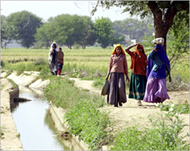Water buffs urge more crop per drop
Scientists have called for radical action to improve global water management as one-third of the world’s population faces water shortages.

More efficient use of the world’s water is needed to reduce poverty and environmental damage but the world’s supply is not running out, an international report said on Monday.
“One in three people is enduring one form or another of water scarcity,” the International Water Management Institute (IWMI) said in a report compiled by 700 experts and backed by the United Nations and farm research groups. The report suggests that water supplies are more stretched than previous estimates.
About 74% of all water is used for irrigation. Industry and energy production uses about 18% and just 8% goes to individual households.
Irrigation to produce food and biofuels will consume increasing amounts of water as the world’s population grows.
“Conquering hunger and coping with an estimated three billion extra people by 2050 will result in an 80% increase in water use for agriculture on rain-fed and irrigated lands,” the report said.
Water scarcity
The report said that about 1.5 billion of the world’s population of 6.1 billion lives in areas where water is scarce – such as North Africa, northern China or parts of the southwestern United States.
 |
|
Irrigation for producing food and |
Another one billion people live in regions, such as sub-Saharan Africa or northern India, where water is available in rivers and aquifers but they lack the infrastructure to exploit it.
But the report concluded that the world is not running out of water, and said there was enough land, water and human capacity to solve the problem.
“The big solution is to find ways to grow more food with less water. Basically, more crop per drop,” David Molden, the scientist who led the study, said. “The number one recommendation … is to look to improve rain-fed systems in sub-Saharan Africa and South Asia.”
Maximise resources
Expensive dams and canals are not the answer for Africa, the report said. Better irrigation, rainwater harvesting from roofs, building more water storage and developing drought-resistant crops are needed to maximise water resources.
Poverty could also be reduced by raising the value of what a farm produces after basic food needs are met.
“If a poor person grows flowers instead of maize, that’s a way of getting more value per drop,” Molden said.
Experts suggested that a greater understanding of the value of water is needed.
One calorie of food takes roughly one litre of water to produce. But different foods put different pressures on water resources – one kilo of grain needs only 500-4,000 litres while a kilo of industrially produced meat needs 10,000 litres.